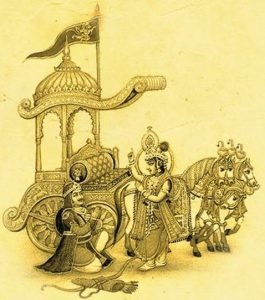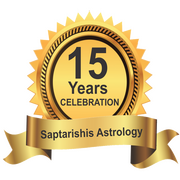Related Articles
Yoga Of Knowledge
Karmayoga Is Ancient
Shri Krishna says, “I had told this Yoga (Karmayoga) earlier to Vivaswat (the Sun-deity) But that was long ago. He then told this to Vaivaswat Manu. Manu acted according to it and advised Ikshwaku about it. In this tradition many Royal Yogis came to know it but there does not seem to be anyone who knows about it now. This is because people, having become more attracted towards carnal pleasures, forgot about the Knowledge of the Self. Having gone astray in their beliefs they came to think that carnal pleasures are the highest kind of happiness. (4:16-21). How will the ignoramus who have not ever experienced an iota of dispassion and who do not understand what discrimination is, can attain me? I do not know how this delusion grew, but a lot of time was lost with the result that this yoga was forgotten on this earth. Arjuna that is the yoga which I explained to you. This yoga is like a life-secret, but how can I conceal it from you? (4:25-28).
Arjuna’s Doubt
At this, Arjuna raised a doubt by asking Shri Krishna, “You are living today and Vivaswat lived in ancient times. Then how could you have told him this Yoga?” (4:32-40).
Shri Krishna Remembers All Avatars
Shri Krishna replied, “It is natural that you should think you were not existing at the time Vivaswat was existing. What you do not know is that both you and I have gone through many births. You have no memory of them but I remember all my incarnations.

“I Take Birth To Protect The Good In Every Era”
Though not tainted by birth (i.e. subject to birth-death cycles), I do take birth and assume form by means of Maya, but this does not affect my remaining untainted by destruction, form and attributes. (4:44-46). Because it is the tradition from early times that I should protect the Dharma (righteousness) appropriate to the particular age (Yuga), I take birth to protect my devotees and destroy the ignorance whenever wickedness defeats righteousness. (4:49-50). Then I eliminate the wickedness and erase the stains of the sins and by bringing together the Dharma and ethics remove the lack of discrimination. Whole world then fills with happiness; Dharma reigns in the world and devotees are full of Sattva attribute. Whenever I take birth, sins vanish and merit rises. I take birth for these tasks in every Yuga. Only persons of knowledge know this secret of mine. (4:51-57)
He who understands that I am not attached to anything, that I take birth though I am birthless and perform actions though I am action less is liberated. Though he may be in his body yet he is not bound by it. He comes to me when he dies. (4:58-59).
Gracing Devotees According To Perception
Those of my devotees who do not bother about the past or the future are not affected by anger and desire. They become one with me and spend their life only for serving me. Those who are immersed in the knowledge of the Self by becoming unattached, become one with me and then there is no difference between them and me. (4: 60-63)
I grace people according to the manner by which they express their devotion to me. It is the natural tendency of man to do my upasana (worship). But through ignorance or due to delusion, most people think of me in many different forms though I am one and the only God. I am without name but they assign different names to the different forms which they consider as deities. I am all pervading but they qualify my forms as superior or inferior. (4:66-70). With desire in their minds they worship these deities. They gain the fruits there from but actually that is the fruit of their actions, there being nothing other than actions which can give fruits. (4:71-73). I am the witness to the worship of all these deities but each worshipper gets the fruits according to his attitude. (4:76)
Four Castes
Though all persons are alike, I have divided them into four types according to their qualities and actions. Thus the four castes have been created. The actions prescribed for each caste have been determined taking into account the combination of their natural tendencies and qualities. Therefore even though the four castes have originated from me, I am not their creator and one who understands this is liberated from the ties of the actions. (4:77-81).
The desireless actions of the past seekers who understood this led to their liberation. (4:82-83).
Thoughts Of Actions Involve
Even wise persons are puzzled about the significance of action and non-action therefore it should not be interpreted as one likes. (4:84-85). The actions of even spiritually very powerful persons have turned out to be desireful actions because of wrong notion of actionlessness. (4:87). I shall explain this to you. (4: 88)
What leads to the formation of the Universe should be understood as action and its meaning should be understood first. One should also understand the appropriate action for each caste and the fruits thereof. Also one must understand the nature of the prohibited actions so that one does not get involved in them. This world is governed by actions therefore the scope of actions is very mysterious. (4:89-92)
A Perfect Person :- Now listen to the characteristics of a person who has reached perfection. Even as he performs actions he does not consider himself to be the doer and does not keep expectations about the fruits. Apart from a sense of duty, he has no other reason for actions. It must then be considered that actionlessness has been well ingrained in such a person. Such a person should be considered as having understood the meaning of non-action and an enlightened person. (4:93-95). He who realizes Self knowing that performance of his actions is unreal from the point of view of the Self is a real person of non-action. (4:98). He enjoys the worldly pleasures without being attached or being affected by them. And even by remaining in one place he travels through the universe and actually himself becomes the universe. (4:101-102). He who is not averse to actions nor is drawn to them and is not tainted by the ambitious thoughts like “I shall do this” or “I shall complete this” and has offered all his actions to Knowledge should be considered as Supreme Brahman itself. (4:103-105).
He is not bothered about his person, is desire less about the fruits of his actions and is always happy. He is always content but constantly seeks the experience of the Self. (4:106-107). Shedding expectations and ego, he experiences more and more the sweetness of the bliss of the Self. Therefore he is happy with whatever comes to his lot. He does not say that this is mine and that is somebody else’s. The very actions he performs merge into him because he does not see anything other than Self in this world. How can actions affect such a person? (4:108-112). There is no doubt that such a person is liberated in all ways, he remains action less even while doing actions and attribute less even though outwardly he may appear to have attributes. (4:114). Since he considers action itself as Brahman all his actions become non-actions and therefore he remains unattached to them. (4:121).
Yajnas
Now Shri Krishna tells about various kinds of Yajnas. (Note that traditionally a Yajna needs a fire in which various sacrificial offerings are made.)
Some people practise yoga after attaining maturity by giving up the indiscrimination from their nature and adopting dispassion. This is their yajna in which they indulge day and night. Only those who have sacrificed the ignorance along with their mind in the fire of (i.e. with the help of) the mantras given by their Guru should do this yajna. (4:122-123).
Daivayajna: A yajna, performed in the fire of Yoga with the intention of attaining Self is called Daivayajna. (4:124).
Brahmayajna: Some others follow the path of knowledge to attain Brahman. This is also a type of Yajna in which Knowledge itself is burnt as an offering in the fire of Brahman until Knowledge and the knower become one with the Brahman. This is called Brahmayajna. (4:125).
(N.B. These two yajnas are mentioned in the Gita Shloka 4:25 which is translated as “Some yogis worship the deities alone while others offer sacrifice itself by the way of sacrifice in the fire of Brahman.” This is difficult to understand in the original but Dnyaneshwar Maharaj has expanded upon it.)
Meditation: Some sacrifice the sense pleasures through self control and practice of three stages of yogic meditation (viz. Dhyan, Dharana and Samadhi). (4:125-129).
Yajna of Self-control: Some others burn their desires and ambition from the five sense-organs after attaining dispassion. Thus all the bad attributes vanish. (4:130)
Guru-mantra: Some others, with dispassionate attitude and the continuous chanting of the mantras given by their Guru, began lighting the fire of knowledge (of the Self) and after avoiding the pitfalls of occult powers (Siddhis) achieved the first spark of Knowledge. After controlling the mind and burning the desires and family ties and through control of breathing (Pranayama) they become one with the Brahman. What remains is the bliss of the knowledge of the Self. (4:131-139)
These are all different types of yajnas but with the same goal. (4:140).
There are other types of Yajnas also e.g. Dravyayajna or offering of wealth, Tapoyajna or performing penance, and Yogayajna or practicing Yoga. Some offer words i.e. speech as Yajna which is called Vagyajna. Others offer their learning to attain Brahman and that is called Dnyanyajna. (4:141).
Arjuna, all these yajnas are difficult and laborious. But persons who control their senses and practice yoga can do them because they have sacrificed their ego. (4:142-143).
Pranayama There are still others who practice Pranayama i.e. Breath control. Such yogis are called Pranayamis. (4:145). Some others use a technique called Vajrayoga in which diet is controlled and Pranas are sacrificed into Prana. (See note regarding Pranas at the end of Ch 6). All these persons who shed the grime from their mind by various yajnas have liberation as their goal. (4:146).
Attaining Brahman By Yajnas
Thus, all these people perform these various yajnas with the intention of attaining liberation and wash away their impurities of the mind by their means. (4:147). After the ignorance about the Soul is burnt away what remains is its pure form alone and then there remains no difference between the sacrificial fire and the performer of sacrifice. Thus the intention of the performer is fulfilled, sacrifice ends and all actions get nullified. Then the thoughts or imaginations do not enter the mind, the duality ends and with the ultimate Knowledge that remains they experience the unification with the Brahman. (4:148-151).
Others lead a wasted life But those, who after being born do not practice yoga or perform yajnas or practice self-control have an unworthy life in this world and their status in the afterworld need not even be mentioned. (4:152-154). All these yajnas, described in detail in the Vedas are possible only through actions and when one understands this then those actions do not bind him. (4:155-156).
Dravyayajnas Inferior to Dnyanayajnas The yajnas broadly described in the Vedas needing external actions (like burning materials in fire) lead you only to, attaining heavenly plane. But these are all dravyayajnas i.e. yajnas involving wealth and are very inferior to the dnyanayajnas or yajnas of knowledge. (4:157-158).
Serving Saints Gives Knowledge
If you desire to gain this most superior knowledge then you should serve saints in every way. They are the depository of knowledge and service is the gate to it. Therefore capture it by serving them. Then make your obeisance to them with all you have, and shedding your ego be their servant. Then ask them questions about whatever you wish to know and they will explain it to you. Once you understand it desires will not enter your mind. You will lose all your fears and be fit to attain Brahman and will see everything including yourself as my form. Thus your delusion will vanish once you get the favors of a true Guru. (4:164-170)
Knowledge Is Incomparable
This knowledge is so powerful that it can remove the ignorance in your mind even if you are a worst sinner or full of illusion and delusion. There is nothing else in this world comparable to Knowledge and as encompassing. (4:172-174). This knowledge cannot be compared with anything except itself just as if one asks the taste of nectar the answer is like nectar and nothing else. Now I shall tell you how to gain that Knowledge. (4:180-185).
Peace Comes With Knowledge
Knowledge seeks him who is fed up with sense-pleasures in preference to the pleasure of the Self-realization, who does not bother about the sense organs, who does not allow desires enter his mind, does not feel responsible for the things which occur naturally and who has become happy by faith. Peace resides in the mind of such a person. Once the Knowledge becomes firm in his mind he attains self-realization and peace reigns in his mind. He sees peace wherever he casts his glance and duality about “this is mine” and “that is another person’s” vanishes from his mind. (4:186-190).
Uninterested Person’s Life Is Meaningless
What meaning does the life of a person not interested in knowledge have? Death is preferable to such a life. (4:192). A person may not have gained knowledge but if he shows even a little interest then there is some hope that he will gain it. But if he does not then he will be surely afflicted by doubts. (4:194-195). One who is thus afflicted by doubts can be definitely considered as lost to the happiness in this world as well as the next. (4:198). A doubting person does not differentiate between truth and falsehood, proper and improper, beneficial and harmful. (4:200). Therefore there is no greater sin than to doubt. The one means of destroying it is the Knowledge. (4:202-203). Therefore Arjuna, get rid of the doubts in your mind. (4:208).
Notes:
Vivaswan, Vaivaswat manu and Ikshwaku (4:16-21): According to the Puranas, Vivaswan is the Sun-god of the Vedic times. He was one of the twelve sons of Adti known as the Adityas born of Rishi Kashyap. The latter was the son of Marichi, one of the seven Rishis (Saptarshi) considered to be the sons of Brahma the Creator, born from his will power. Vivaswat’s son Vaivaswat was a Manu that is progenitor of mankind. Manu’s son Ikshwaku is the first of the Solar dynasty of kings (so called because his grandfather was the Sun-god Vivaswan). Solar Dynasty ruled in Ayodhya in north India. Shri Rama the hero of Ramayana was the 58th king in the genealogy given in the Puranas.
Historians, interpreting the tales given in the Puranas, say that of the twelve Adityas Indra, Varuna, Vivaswan and Vishnu became the most distinguished. They belonged to the Deva branch of Aryans as opposed to the Asura branch of Aryans which settled in Persian region and were always at war with the Deva Aryans.
Vivaswan was not a warrior but a man of learning and a poet. Indra and Vishnu led the Aryan clans in their migration to the Afghanistan region and the Northern part of India. The conquered lands were distributed among 22 groups of which 11 were in India. Manu belonged to one of the latter. He chose Ayodhya on the banks of river Sharayu as the capital of his kingdom. Like his father Manu also was not a warrior but a man of learning, religion and peace. He is credited with the Code of Ethics known as Manusmriti. After a short rule of about 10 years Manu retired to the forest leaving the kingdom to his son Ikshwaku. This probably occurred in about 2800 BC. Incidentally, Manu’s daughter Ila was married to Budha, son of Soma (also considered as Moon in the Puranas) from Tara, the wife of Brihaspati the Guru of the Devas. Soma had eloped with Tara who was later returned to Brihaspati but by that time Tara was pregnant. Since Soma was Budha’s father, the dynasty that emerged from Budha and Ila is called the Moon or Lunar dynasty. Shri Krishna, Pandavas and Kauravas belonged to this Lunar dynasty.
Learn Astrology: Join Our Upcoming Astrology Classes — Click Here
Learn Astrology: Join Our Recorded Astrology Classes — Click Here
 Saptarishis Astrology Magazine Into Creating Astrologers
Saptarishis Astrology Magazine Into Creating Astrologers






